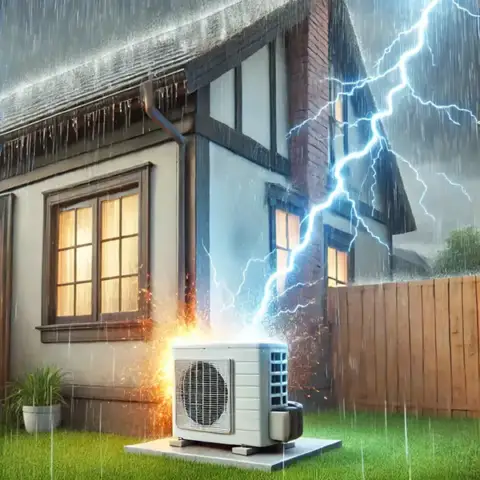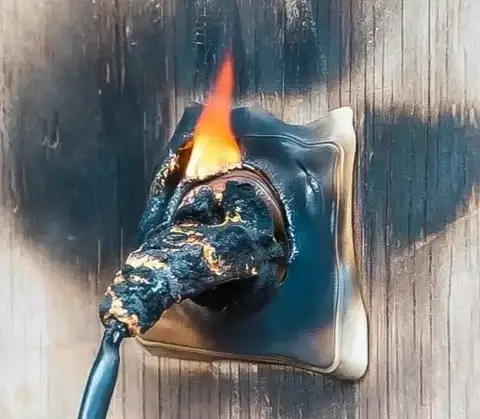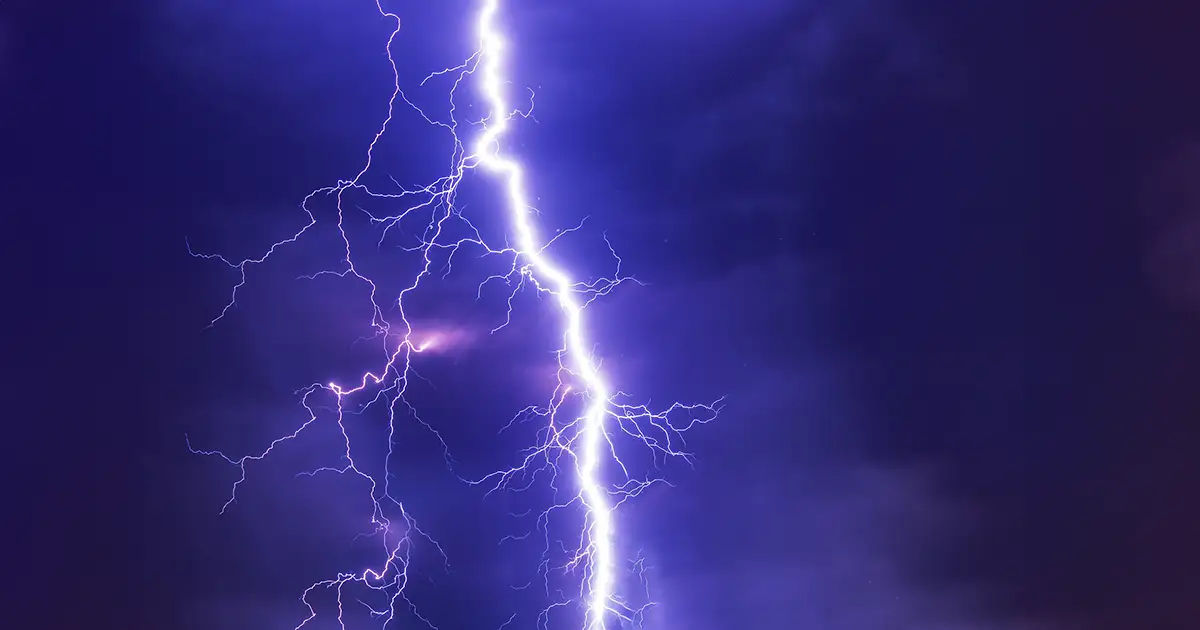Homeowners across Texas are proud of their life’s most significant investment and take all sorts of precautions to keep it safe. They install security systems, purchase insurance, and perform regular maintenance. But there’s another potential threat lurking that many homeowners overlook—power surges.
These sudden and often unpredictable voltage spikes can wreak havoc on your home’s electrical systems, especially your HVAC system. In Greenville, TX, where summer storms and power grid fluctuations are not uncommon, the importance of surge protection for your HVAC system cannot be overstated.
Let’s dive into the topic of HVAC surge protectors and discover why installing one will help safeguard your home’s comfort and avoid costly repairs.
What Is a Power Surge and How Does It Impact Your HVAC System?
A power surge is a sudden, short spike in electrical voltage that travels through your home’s wiring. These surges can be caused by a variety of factors, such as:
- Lightning strikes
- Faulty or aging wiring
- Downed power lines
- Fluctuations in the power grid
- Large appliances cycling on and off
These surges last for only a fraction of a second, but the damage they cause can be devastating, especially to sensitive electronic components within your HVAC system.
Think of voltage like water pressure in a hose—if too much pressure builds up, it can burst the hose. Similarly, a power surge can send a burst of electricity through your system that overloads and damages crucial parts of your HVAC system.
The Hidden Vulnerabilities of Your HVAC System
You might not think of your HVAC system as particularly vulnerable to electrical issues—it’s mostly heavy-duty equipment, right?

The truth is that modern HVAC systems are more complex and sophisticated than ever before. They contain sensitive electronics such as control boards, thermostats, capacitors, and compressors. These components are essential for your system’s operation, but they’re also fragile when faced with an unexpected surge of electricity.
For example, your HVAC control board acts as the “brain” of the system, managing communication between the thermostat and the other components that control heating and cooling. If a power surge hits, it can fry this vital component, leading to system shutdowns or erratic behavior.
Similarly, the compressor motor, which is responsible for pressurizing and moving refrigerant through the system, is particularly at risk during a surge. Excessive electrical energy can cause the motor’s wires to overheat and burn out. Replacing a compressor can easily cost thousands of dollars, not to mention the discomfort of being without air conditioning during a Texas heatwave.
These vulnerabilities highlight the importance of taking proactive measures to protect your HVAC system from power surges.
How Surge Protectors Work to Shield Your HVAC System
A surge protector acts as your HVAC system’s first line of defense against damaging voltage spikes. The basic idea behind a surge protector is simple: it intercepts excess electricity. It diverts it away from sensitive components, typically sending it into the ground where it can safely dissipate.
Surge protectors utilize a component called a Metal Oxide Varistor (MOV). When a power surge occurs, the MOV quickly adjusts its resistance, allowing it to divert excess voltage away from your HVAC system’s electronics and toward a safe grounding path. Essentially, it acts as a pressure valve, ensuring that dangerous voltage spikes don’t reach critical components.
In addition to the MOV, some surge protectors feature thermal fuses, which provide an extra layer of protection by disconnecting the electrical circuit if the surge protector overheats. This helps prevent the risk of fire or further damage to the system.
After the surge protector has absorbed the surge, it returns to its normal state, ready to protect your HVAC system from the next spike in voltage.
In some cases, particularly after a large surge, the surge protector may need to be replaced, which is a small price to pay compared to repairing or replacing an HVAC unit.
Types of Surge Protectors for HVAC Systems
Surge protectors come in several different forms, each designed to meet various needs depending on the level of protection you want for your home:
Whole-House Surge Protectors: Installed at your home’s main electrical panel, these devices protect your home’s electrical systems, including your HVAC system, from surges. Whole-house surge protectors are an excellent choice for comprehensive protection, especially in areas like Greenville, where storms and power outages can cause widespread electrical disturbances.
Dedicated HVAC Surge Protectors: These are installed directly at the HVAC unit to provide targeted protection for the sensitive components of your system. This option is beneficial if you’re focused on protecting your HVAC system specifically, or if a whole-house protector isn’t feasible for some reason.
These surge protection options offer a significant level of defense against surges. In many cases, homeowners opt for both types to ensure the highest level of protection.
Let’s get to the heart of the matter: why is surge protection for your HVAC system essential? The answer lies in both cost savings and peace of mind.
Protect Your Investment

Your HVAC system is one of your home’s most expensive pieces of equipment, often costing several thousand dollars to install or replace. Even a brief surge could fry sensitive electronics without protection and leave you with a hefty repair bill.
Repairing damaged HVAC components, such as a control board or compressor, can quickly add up. For instance, replacing a compressor can cost between $1,500 and $3,000. If a power surge completely destroys your system, you could face a complete replacement costing upwards of $8,000 to $15,000 or more. Compare that to the cost of installing a surge protector, which typically runs between $250 and $400, including labor. It doesn’t take a mathematician to see which route is the smarter investment.
Surge Protectors Are Not a DIY Project
Although installing a surge protector might seem like a simple task, it’s best left to professionals, particularly when dealing with your HVAC system. Here’s why:
- Safety First: Working with electricity can be dangerous, especially when dealing with high-voltage systems like your HVAC unit. A licensed technician has the expertise to install the surge protector safely and correctly.
- Proper Grounding: The effectiveness of a surge protector depends on proper grounding. If the surge protector isn’t grounded correctly, it won’t be able to divert excess voltage, rendering it useless. An HVAC professional will ensure that your system is grounded correctly.
- Optimized Performance: A professional can assess your HVAC system and determine the best type of surge protector for your needs. Whether it’s a whole-house protector or a dedicated unit, the technician will install the device to maximize protection and efficiency.
- Warranty Considerations: Many HVAC systems have manufacturer warranties that are voided if an unlicensed individual performs repairs or modifications. By hiring a licensed HVAC technician, you can maintain the validity of your warranty while ensuring that your system is properly protected.
What About Insurance?
Many homeowners assume their insurance policy will cover damage caused by power surges, but this isn’t always true. While some policies may provide coverage for specific types of power surges—such as those caused by man-made sources like downed power lines—coverage for surges caused by natural events like lightning strikes is often excluded.
Even in policies that cover surges, most contain limits that don’t fully cover the cost of HVAC repairs or replacements.
This is where the value of a surge protector becomes even more apparent. By preventing the damage in the first place, you avoid the headache of dealing with insurance claims, deductibles, and the possibility of only partial coverage.
Final Thoughts
Installing a surge protector for your HVAC system is one of the smartest investments you can make as a homeowner. It protects your system from costly repairs and replacements. It ensures that you and your family stay comfortable year-round, no matter what’s happening with the power grid.
If you’re in Greenville, TX, and want to protect your HVAC system, Wright’s Air is here to help. Our experienced technicians can assess your system and install the right surge protector to keep your home comfortable and safe.
Don’t wait for the next storm or power outage—contact Wright’s Air today at (903) 455-5662 to schedule your surge protector installation and enjoy peace of mind knowing your HVAC system is protected from unexpected surges.

